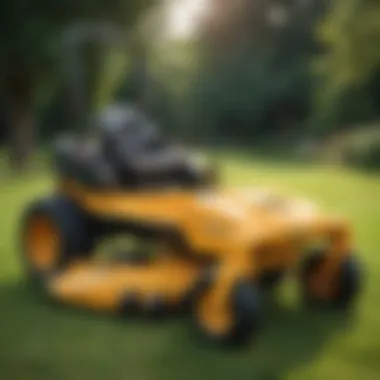A Guide to Walker Mower Dealers and Their Impact


Intro
In the domain of agricultural and horticultural machinery, Walker mowers stand out as a symbol of efficiency and innovation. These robust machines are designed to tackle various landscaping tasks, from mowing vast expanses of grass to maintaining the precision needed for gardens and parks. However, to truly appreciate the value these mowers offer, one must first understand the role of Walker mower dealers.
Walker mower dealers serve as the vital link between the manufacturer and the end-user. They are not merely sales agents; they embody expertise, knowledge, and support that customers rely on. From helping you navigate the wide variety of Walker mowers available to providing ongoing servicing, these dealers enhance the customer experience significantly.
For anyone involved in farming or landscaping, having a reliable dealer isn’t just helpful; it’s crucial. This guide aims to unfold the many layers of Walker mower dealerships, from their significance in the market to practical insights and trends that shape the industry. Whether you are an industry professional or a passionate enthusiast, this comprehensive guide will provide the necessary tools for understanding and making informed decisions in the world of Walker mowers.
Prelude to Walker Mower Dealers
Walker mowers have carved out a niche in the landscape of outdoor power equipment, especially for those engaged in agriculture or horticulture. This section explores why understanding Walker mower dealers is vital for both professionals and enthusiasts. The dealer's role extends far beyond mere sales; they serve as a bridge between the manufacturer and the user, providing essential services that can greatly enhance the efficiency and longevity of the mowers.
Defining Walker Mowers
Walker mowers are designed to meet specific needs, particularly in terms of maneuverability and ease of use. Unlike traditional riding mowers, Walker mowers often feature a compact design that makes them ideal for intricate landscapes. They come equipped with various attachments and accessories, allowing them to perform multiple tasks beyond just mowing. The distinctively low center of gravity ensures stability on uneven ground, making these mowers a favorite among landscape professionals who navigate through residential gardens or expansive green spaces.
"Understanding what makes Walker mowers unique is the first step in making an informed purchase."
Role of Dealers in the Market
The significance of dealers in the Walker mower market cannot be overstated. They act as informants who possess in-depth knowledge about the products. These dealers evaluate customer needs and recommend suitable models. Besides that, they facilitate a plethora of services, including maintenance and repair. Good dealers will not only sell you a mower but also provide ongoing support, ensuring your machine runs like a well-oiled clock for years to come.
- Customer Engagement: A quality dealer engages customers through education, demonstrating how to maximize the use of their products.
- Technical Support: They'll offer troubleshooting advice, often saving users time and potential repair costs.
- Product Availability: Dealers ensure a good selection of models and parts, which is crucial for minimizing downtime during peak seasons.
Overall, it’s evident that forming a partnership with a trustworthy Walker mower dealer can greatly influence the performance and longevity of these specialized machines. Understanding your dealer's role could be the difference between a fruitful mowing season and a frustrating ordeal.
Types of Walker Mowers
Understanding the types of Walker mowers is vital when delving into the various attributes and benefits these machines offer. Walker mowers are not just about cutting grass; they serve a much larger purpose in both commercial and residential settings. Knowing the differences can help buyers make informed decisions based on their particular needs and expectations.
Commercial vs. Residential Mowers
Commercial Walker mowers are designed to tackle large areas efficiently and can withstand rigorous use. These machines often feature larger engines, increased cutting widths, and enhanced durability. Users in the landscaping business, for instance, require mowers that can handle extended hours of operation and demanding terrains. In contrast, residential Walker mowers prioritize comfort and usability, making them more suited for home lawns. They often include features like easier handling and less maintenance.
When making a choice, consider factors such as:
- Frequency of Use: Daily mowing calls for a commercial model, while occasional mowing might only require a residential one.
- Area Size: Larger properties benefit from more powerful, wide-cutting commercial mowers. Smaller yards can get by with compact models.
- Budget: Commercial mowers are more expensive; assess the long-term cost to ensure that it aligns with your needs.
Understanding this segmentation can keep you from dropping a pretty penny on a mower that doesn’t meet your requirements or, on the flip side, buying one that’s too lightweight for your needs.
Specifications and Features
Walker mowers come packed with specifications that can significantly influence performance. Some notable aspects include engine power, cutting capacity, and fuel efficiency. For example, models equipped with bio-fuel engines tend to have better emissions ratings, an increasing consideration for eco-conscious buyers. On the flip side, features like a floating deck—which allows for flexibility over uneven terrain—can be a game-changer when maintaining diverse landscapes. Key specifications to review involve:


- Cutting Width: Ranges generally from 42 to over 60 inches, an essential metric for determining mowing time.
- Horsepower: Engine power varies; higher horsepower is ideal for tough, demanding jobs.
- Transmission Type: Consider a hydrostatic transmission for smoother operations and less gear-shifting hassle.
A clear grasp of these specifications will better equip users to find the right mower that suits their operational needs, functioning as an excellent partner in lawn maintenance work.
Innovations in Design
The realm of Walker mowers has not remained stagnant, as innovation is at the forefront. The introduction of zero-turn technology has transformed how operators maneuver around obstacles. This feature is ideal for intricate landscaping jobs, enhancing both time efficiency and precision. Modern options also boast ergonomic seat designs and joystick controls, which can lessen the physical strain during long hours of mowing.
Additionally, the focus on sustainability has fueled developments in electric and hybrid Walker mowers, making them a more attractive option in today’s eco-conscious market. Some recent innovations worth looking into include:
- Smart Technology Integration: Apps that help monitor mower metrics and maintenance schedules.
- Lightweight Frame Materials: Improved durability without added weight, enhancing ease of use.
- Advanced Blade Engineering: Providing cleaner cuts that promote healthier grass growth and reduce stress on lawn.
An understanding of these innovations can provide insightful perspectives into which mower aligns with personal values and operational requirements.
"The choice between commercial and residential Walker mowers hinges not just on size but on a vivid understanding of needs, the specifications that matter, and the innovations that elevate efficiency and effectiveness."
Evaluating Walker Mower Dealers
Evaluating Walker mower dealers is crucial for anyone looking to invest in quality lawn care equipment. The right dealer can make all the difference when it comes to performance and reliability of the mowing machines. It's also about finding partners that can support and enhance your experience as a buyer. Going beyond just selecting the best price, this section delves into the essential criteria, the importance of dealer reputation, and key metrics in customer service that pave the way for ensuring you make an informed decision.
Criteria for Selection
When searching for a Walker mower dealer, there are several factors to keep in mind that are instrumental in determining their suitability:
- Product Lineup: Not all dealers carry the same brands or models. Make sure the dealer offers a wide selection of Walker mowers to choose from. This variety can often bring you closer to fulfilling your specific requirements.
- Pricing Structure: Transparency in pricing is important. A reputable dealer should provide clear and competitive pricing. Be cautious of deals that seem too good to be true; they often are.
- Warranty and Service Options: Look into what warranty options are available. A solid warranty reflects the dealer’s confidence in the products they sell. Furthermore, inquire about the availability of service and maintenance options post-purchase.
- Location and Accessibility: Consider how easy it is to reach the dealer. Local dealers can often offer faster service and support, which is particularly invaluable during peak mowing season.
- Financing Options: Depending on your budget, having financing options can make the difference. Investigate if the dealer collaborates with financial institutions to provide assistance.
Assessing Dealer Reputation
The reputation of a dealer is often an overlooked aspect but can serve as an indicator of future satisfaction. To thoroughly assess a dealer’s reputation, one should:
- Read Online Reviews: Websites like Reddit or Facebook can offer insights into past customers' experiences. Look for consistent themes in these reviews, whether they're positive or negative.
- Engage with Community Members: Talking to neighbors or peers who have previously purchased from a dealer can yield valuable firsthand information.
- Check Industry Awards & Certifications: A dealer that has received accolades or belongs to professional organizations often upholds higher standards in both sales and service.
Always remember: A dealer’s reputation is built over years and can tell you much about their business practices.
Customer Service Metrics
Outstanding customer service is a key differentiator in choosing a dealer. Here are some metrics to consider:
- Response Times: In a world where time is money, quick replies to inquiries set a standard for customer care. Gauge how long it takes for your questions to be answered.
- Service Quality: Investigate how the dealer handles service issues. Is there a systematic approach to addressing complaints or repairs? Are technicians available to provide swift assistance?
- Follow-Up Practices: Reliable dealers often reach out post-sale to ensure customers are satisfied and to see if they need further assistance or tuning up of their mowers. Consider how the dealer's follow-up systems work.
- Technical Support Availability: How accessible is their support network? The level of accessibility can vary largely between dealers; ensure you have reliable support when needed.
In summary, evaluating Walker mower dealers takes a bit of effort but can yield significant returns in the long run. The right dealer not only provides you with a quality product but also plays a vital role in your ongoing relationship with your equipment. Investing time in this evaluation process can save you both time and money, ensuring your mower performs at its best.
Dealer Relationships and Support


Creating robust relationships between walker mower dealers and their clients has a foundational role in ensuring product satisfaction and loyalty. Effective partnerships hold the potential to foster trust and reliability in this niche market, driving sales while meeting customer demands. These relationships don't just benefit the dealers; customers reap the rewards through better service, knowledgeable guidance, and tailored solutions.
Building Strong Partnerships
Strong partnerships between Walker mower dealers and customers often serve as the bedrock of successful transactions. These relationships thrive on mutual respect and knowledge sharing. For instance, a dealer who takes the time to understand a farmer's specific mowing needs can recommend the right model, ensuring that the investment made aligns with the agricultural goals of the customer. A personal touch goes a long way in establishing these bonds.
- Communication is key: Keeping an open line of dialogue helps in addressing any concerns that may arise during the purchase and ownership phases. Whether it’s discussing financing options or clarifying technical specifications, proactive communication lays a solid groundwork for trust.
- Local Engagement: Many successful dealers also engage in community activities, such as agricultural fairs or local workshops, to build rapport. Connecting on a local level can help in showing customers that their dealer is a vested member of the community, enhancing loyalty.
Training and After-Sales Support
Education doesn’t stop at the point of sale. Training and after-sales support are critical in ensuring customers feel confident in their purchases. Walker mower dealers can offer a variety of support services that enhance user experience.
- Operational Training: Providing customers with training on how to operate their mowers can minimize potential misuse. This can include hands-on demonstrations or online tutorials that cover basic and advanced operational aspects.
- Maintenance Services: Offering maintenance packages can be a game changer. Customers appreciate when dealers take the initiative to schedule service appointments, ensuring their machines perform optimally throughout their lifespan. An annual check-up can help in catching issues before they escalate into costly repairs.
Feedback Mechanisms
Feedback loops are essential in understanding customer satisfaction and identifying areas for improvement. Dealers who actively seek feedback often develop deeper relationships with their customers.
- Surveys and Questionnaires: Simple, concise surveys can gauge customer satisfaction levels effectively. Questions can range from product performance to service speed, which help dealers measure the quality of both their products and support.
- Online Platforms: Utilizing social media or community forums like Reddit helps in gathering perspectives from a wider audience. Engaging with users on platforms such as Facebook gives dealers insight into customer opinions while allowing them to respond swiftly to any concerns.
"Customer relationships are built on trust. A dealer who listens and responds will always have an edge in this market."
Ultimately, the essence of dealer relationships and support lies in an unwavering commitment to customer satisfaction. By fostering strong partnerships, giving comprehensive training, and actively seeking feedback, Walker mower dealers can navigate the complexities of the market while ensuring that their clients feel valued and supported.
Market Trends and Forecasts
Understanding the market trends and forecasts in the realm of Walker mower dealers is essential for both current stakeholders and potential entrants. The mower industry is continuously evolving due to technological advancements, changing consumer preferences, and a growing emphasis on sustainability. Spotting these trends early can provide a competitive edge. Moreover, forecasts not only point towards possible future scenarios but also help stakeholders to strategize effectively for upcoming shifts in demand and supply.
Current Market Landscape
The current market landscape showcases a shift toward electric mowers, which are gaining traction due to their reduced environmental impact and operating costs. According to several industry surveys, around 30% of consumers now prefer battery-operated models over traditional gas mowers. This change reflects a broader trend in consumer behavior that values sustainability. In addition, the impact of the COVID-19 pandemic has brought about a surge in home gardening and landscaping, creating an unexpected growth opportunity for mower dealers.
Moreover, understanding competitors is crucial. Brands like Hustler Turf and Cub Cadet are innovating rapidly, intensifying competition. Dealers are thus positioned between managing inventory and performances from multiple brands, which can be daunting yet lucrative. Building strong relationships with customers becomes fundamental in this environment as it ensures loyalty amid the fluctuating market dynamics.
Emerging Technologies in Mowing Equipment
Today's mowers are no longer just simple machines; they are becoming technologically equipped marvels. GPS technology and autonomous mowing systems are influencing how mowers operate. With the debut of robotic mowers from brands like Husqvarna, the traditional dealer model is being redefined. These machines offer convenience and efficiency, catering to both commercial and residential users.
Also noteworthy are the developments in smart technology. Mowers equipped with IoT capabilities allow users to connect and monitor their equipment through smartphones. Such innovations bring predictive maintenance into the fold, lowering operational downtime. Dealers who stay abreast of these technological advancements ensure that they can meet the evolving demands of savvy customers who desire cutting-edge features in their lawn care solutions.
Sustainability and Eco-Friendly Practices
The focus on sustainability within the mower industry cannot be overstated. Eco-friendly practices are not just a marketing gimmick; they are becoming a necessity. Dealers are increasingly offering electric mowers, which not only minimize emissions but also operate quietly compared to their gas counterparts.


Additionally, dealers are adopting recycling programs for old mower parts, emphasizing their commitments to the environment. A growing number of customers are willing to pay a premium for products that are environmentally responsible. In fact, a recent survey indicated that approximately 65% of buyers consider sustainability as an important factor in their purchasing decisions.
"The future of the mowing industry hinges on its ability to adapt to changing consumer expectations surrounding environmental impact."
In summary, keeping an eye on the market trends and forecasts is imperative for Walker mower dealers. As the industry shifts towards greater sustainability and technological integration, being proactive in understanding these changes will equip dealers with the insights necessary to thrive.
Challenges Facing Walker Mower Dealers
In the context of Walker mower dealers, challenges are not merely bumps in the road but significant hurdles that can influence the overall health of the business. By understanding these challenges, dealers can grasp the essential dynamics of the market and adjust accordingly. Two main areas of concern have emerged: supply chain issues and the need to adapt to market changes. Both these challenges can substantially affect profitability, customer satisfaction, and long-term viability in a competitive landscape. Addressing them not only boosts operational efficiency but also improves customer relationships and dealer reputation.
Supply Chain Issues
Supply chain disruptions have become a hot topic in various industries, and Walker mower dealers are no exception. A shaky supply chain can lead to delays in delivery, inventory shortages, and ultimately unsatisfied customers. Several factors contribute to these challenges:
- Global shipping delays: The aftermath of the pandemic revealed just how fragile global shipping can be. Parts and equipment that once arrived in a couple of weeks may now take months.
- Raw material shortages: Manufacturers of walker mowers depend on a steady supply of components. Any hiccup in obtaining materials can lead to production delays.
- Increased competition: With rising demand for lawn care equipment, dealers may find themselves in tight competition for limited inventory.
The repercussions of these issues are profound. If a dealer cannot deliver a mower when promised, customers may turn to competitors. Consequently, it demands a focus on building strong relationships with suppliers and adopting flexible inventory management practices. In essence, dealers must be one step ahead, actively managing risks associated with the supply chain.
Adapting to Market Changes
Market conditions are rarely static, especially in the world of agriculture and horticulture. Walker mower dealers face the constant challenge of adapting to these changes to stay relevant and profitable. A few critical market shifts to watch include:
- Technological advancements: The evolution of mowing technology, from electric mowers to smart features, alters consumer expectations. Dealers must keep abreast of these innovations to offer current solutions.
- Consumer preferences: Modern customers are leaning towards eco-friendly alternatives, impacting what products dealers might prioritize. A keen ear to customer feedback can help dealers stay ahead of the curve.
- Economic fluctuations: Changes in the economy can influence spending patterns. Dealers should be prepared to adjust pricing strategies or promotional activities based on such shifts.
By responding proactively to these trends, Walker mower dealers can not only weather the storm but gain a competitive edge. A dealer attuned to market dynamics is in a much stronger position to tailor their offerings and services, ultimately enhancing customer loyalty and satisfaction.
"In the lawn care industry, being reactive can be a costly mistake—staying ahead is the name of the game."
In summary, the challenges facing Walker mower dealers are multifaceted. Supply chain issues may cause operational snags, while market changes can shake up demand. Successful navigation of these challenges requires keen insight, strategic relationships, and an adaptable approach.
Ending
In reflecting upon the landscape of Walker mower dealers, it's undeniable that they play a pivotal role in the overall efficiency of the agricultural and horticultural sectors. By evaluating the complexities involved in dealer selection, understanding their significance in fostering customer relationships, and recognizing market trends, one can appreciate the integral part they play in this industry.
Summarizing Key Insights
From our exploration, several key insights have emerged:
- Role of Dealers: Walker mower dealers serve not just as vendors, but as a crucial link between manufacturers and end-users, providing guidance and specific solutions tailored to customer needs.
- Selection Criteria: Customers should prioritize dealers based on their reputation, customer service metrics, and the support they offer after the sale.
- Market Trends: Keeping an eye on innovations in mower technology and the shifting preferences towards sustainable practices can guide both consumers and dealers in making future decisions.
In essence, understanding these elements enables both buyers and dealers to navigate the market landscape efficiently, promoting a more robust relationship that benefits all parties involved.
Future Directions for Walker Mower Dealers
Looking ahead, it’s clear that Walker mower dealers must adapt to an ever-changing environment. Some areas that warrant attention include:
- Technological Integration: Dealers should invest in training and adopting new technologies that improve efficiency, such as automated systems for inventory and customer management.
- Sustainability Practices: Emphasizing eco-friendly mowing solutions will become increasingly important as consumers value sustainable practices.
- Enhanced Customer Engagement: Dealers need to strengthen their marketing strategies and engage with customers through digital platforms, allowing for direct feedback and quicker service responses.
The future for Walker mower dealers is not just about selling equipment; it’s about building a community around service, innovation, and sustainability. As the industry evolves, those who can pivot and adapt will thrive, ensuring a fruitful relationship with both enthusiasts and industry professionals.







